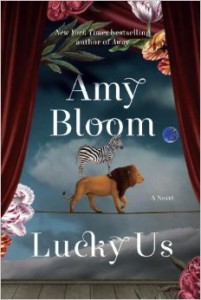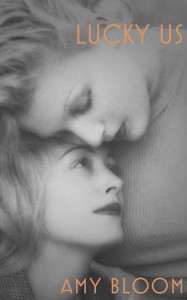 Published by Random House US July 2014, Granta UK September 2014
Published by Random House US July 2014, Granta UK September 2014
256pp
Reviewed by Elsbeth Lindner
‘I was eighteen and taking care of a sick old man and an eight- or nine-year-old boy I hardly knew, making my living as a fortune-teller in East Brooklyn.’
Such is the fortunate life of Eva Acton, the heroine of Amy Bloom’s ambiguously titled new novel. The luck that rains down on Eva, growing up in the USA during the late 1930s and 1940s, tends often to be of the not-so-good variety. Her father Edgar reveals himself to be a bigamist, conman, thief and liar. Eva’s mother abandons her on Edgar’s doorstep. Eva’s stepsister Iris, an actress whose promising Hollywood debut is ruined by scandal, is gradually exposed as cruelly unscrupulous in pursuit of her own desires.
Further tragedies, micro and macro, shape Eva’s life, including racism, the nationalistic excesses of World War II, brain tumours and life-consuming house fires. What saves Eva? Patience, a smattering of good fortune in the form of the loving kindness of strangers and her essentially decent, if passive character.
Bloom’s style, leavened with wit and wisecracks, trades heavily on charm. The misfortunes and catastrophes of her meandering narrative are delivered in a voice both perky and quirky so that although the mood is often dark, the tone is oddly upbeat and vaguely comic. Song titles are used to head each chapter. ‘Characters’ abound, from the gay make-up artist who helps whisk Iris, Eva and unrepentant Edgar from California to New York, to Gus, an American with German origins who is betrayed to the authorities, imprisoned in an American camp and shipped back to Nazi Germany yet who survives the bombs and privations there to redefine himself at the end of the conflict as a Jewish maths teacher. Gus’s and Iris’s letters to Eva pepper the story.
Eva is a late-bloomer of a character. Avoiding formal education, she is nevertheless resourceful and bright, hence the job reading Tarot cards. Bloom endows Eva with wry humour and a kind of doggy solidity but not much more. Her vagueness in this picaresque world of horrible surprises that somehow don’t cut too deeply only adds to the general sense of uncertainty. When, late on Eva, feels angry enough to confront her mother, sparks momentarily fly. But then it’s back to dealing with what comes along – which turns out ultimately to be forgiveness and restoration.
Rarely the architect of her own fate, Eva nevertheless is a mouthpiece for the common wisdom of life: ‘The stars do fuck-all for us: you must make your own luck.’ She doesn’t, but finds some anyway. Isn’t that more the way of it.
